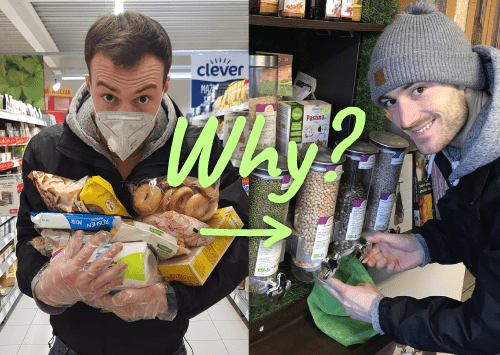
Congratulations!
You’re the winner of 6 millions years of human evolution.
You’ve been selected to live on Earth during the safest, most convenient, and most enjoyable period that humankind has ever known!
If you’re reading me, you’re probably part of the most pleasant status in the world:
The middle-class Westerner!
We’re protected from most natural threats, we have access to the finest medical care, we get a food meals delivered at home in one-click, and we enjoy boundless entertainments.
Our pursue to comfort seems limitless, and we’re so close to accomplish our entire life in an ultra-connected couch.
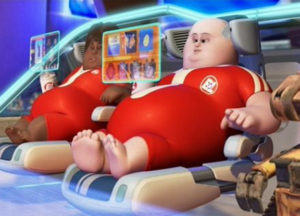
Unfortunately, this ever-growing progress is maintained by a system that has a huge failure.
If we can access so much comfort today, it’s because we exploite natural resources, we transform it with cheap labour force, we consume expansively and we waste to start the process again.
When we use more resources that our planet can generate, this linear approach for progress is impossible to sustain.
As a result, it creates an imbalance in our eco-system, in our health and in human equality.
Going Zero Waste is a journey to balance our needs with our eco-system and other living beings to assure a decent future for the next generations.
Never heard about Zero Waste? Check out the article “What is Zero Waste?”
Rethink our habits with our busy schedule can be challenging. We all have different values and finding the matching sustainable alternative takes time. It’s a long process that has ups and downs.
That’s why we need a good reason to stay motivated!
Whether you’re an planet-lover or a thrifty-financial, here are 9 powerful reasons to go Zero Waste :
1. Solve the Waste crisis
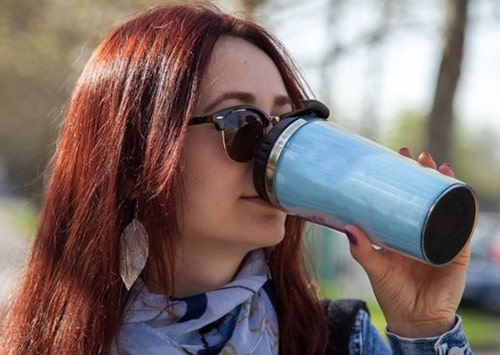
Planet earth is facing the biggest waste crisis of all time.
Every year, 2 billions tons of waste are generated by humans. Governments don’t even know what to do with them! They send it to developing countries that accept them in exchange of money. Most of the time, trash is sent to a landfill or in the ocean anyway.
Guess what’s the most harmful trash of all ? Plastic!
Since the 50’s, we already pilled up 8.3 billion tons of plastic and yearly production is still on the rise.
Don’t we just have to just educate all humans to put their plastic trash in a recycle bin?
Too bad! Only 6% of the plastic waste is recycled worldwide. It’s nothing! And even if we were recycling all of it, we could only recycle it up to 7 times before it loses its properties.
And you know what? Plastic never degrade. It only breaks down into microbeads that now circulates into our food chain. Virtually every piece of plastic that was ever made still exist in some shape or form.
We can hope that we’ll develop a super technology that will solve plastic crisis, but currently, we’re not even close to achieve it !
The most powerful weapon we have is to cut the production of new plastic goods by using alternatives.
Here’s a tip how to start: Removing plastic from your grocery shopping has a fair impact!
In fact, 45% of all-plastic waste comes from daily single-use items and packaging.
Wanna make a change? Discover “how to start Zero Waste groceries” (coming soon)
2. Act for Global Warming
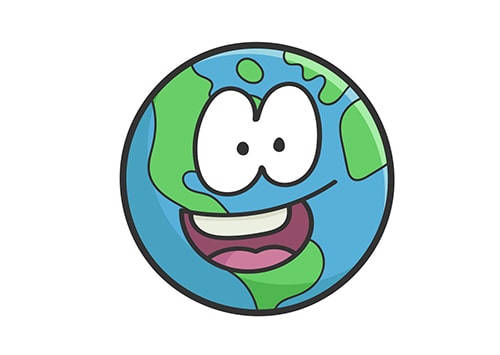
Human activity is now undeniably the cause of global warming. More than 11,000 scientists unequivocally declared the climate emergency which will lead to dramatic disasters if humans are not changing their way of living.
Therefore, world leaders signed up to the Paris agreement in 2015. Ambitious promises aim to limit global warming to 1,5°C and protect our life on Earth.
But nearly 5 years later, the progress was sorely slow and ineffective.
Do we keep hoping and excepting drastic measures from companies and government?
We ain’t got time anymore! Scientist call us to reduce emissions of 80% by in 2050! Changing to low-waste lifestyles is the quickest way to act.
Biodegrading waste in landfill produce an enormous amount of greenhouse gases like carbon and methane. Sending less trash in these landfills is the best way to slow down the process.
But the carbon emissions don’t only come from the waste! Produce our belongings plays also a big in global warming. Extraction, transformation, production, and transportation release a bigger amount of greenhouse gases than the waste itself.
That’s why avoiding waste, buying less, and choosing local products are common practices for zero wasters.
Pssst! Here’s an eco-hacker tip:
The food we put on our plates has a huge impact on climate change. Animal-based products like meat and dairy are responsible for 60% of the agriculture greenhouse gas emissions. Going plant-based is the single biggest way to reduce your environmental impact on the planet.
3. Save biodiversity
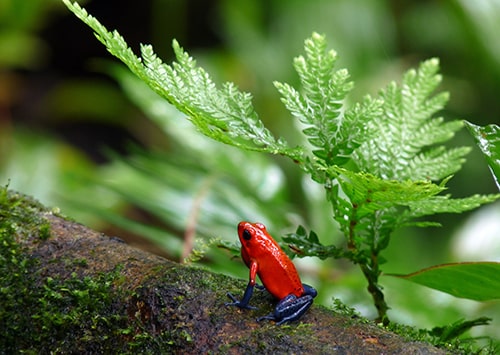
Biodiversity is the result of millions years of evolution. This complex eco-system balances all the elements that maintains life, including humans. Trees purifies the air, seaweed filters out water, plants bring us food and medicines, and bees pollinate crops.
Exploiting natural resources is normal to live a human life. However, our current system pushes us to consume more than what they need and encourages us to discard these resources as soon as we don’t need them anymore.
When humans consume more than nature can provide, it creates a disequilibrium and we’re destroying a heritage that keeps us alive.
Additionally, when all the trash are dumped into landfills or in the ocean, animals are the first victims.
They confuse pieces of plastic with food and birds die from stomachs full of plastic, turtles get straws stuck in their noses and seals are strangled by six-pack rings.
The only way to prevent that is to rethink the way we manage our waste and remove them as much as possible from our lives.
4. Respect animals & living beings

Yum! Today, I’ll have eggs and bacon for breakfast, a sandwich with ham and cheese for lunch and a delicious gourmet burger at the restaurant for dinner.
If this daily menu is casual for us today, it’s thanks to the agro-industry that made these animal-based meals cheap and accessible to everyone. Thank you agro-industry !
And when we check on the packaging, the animals look to be well-treated: A vigorous Highland Cattle grazing in a verdant mountain meadow!
Unfortunately, animal happiness and productivity don’t really sit well. If animal products became so accessible, it’s because the industry transformed animals into super-productive instruments.
Cows are dehorned and being milk during all their life, Pigs are fattened until they can’t walk anymore, chickens grow up in a cage smaller than a A4 paper and they all end up in a slaughterhouse years before their natural death.
Every year, 50 billion farm animals are subjected to these factory farming conditions.
Going plant-based, reducing animal products and opting for local farms food in our diet are Zero Waste habits that have a huge positive impact on our environment.
5. Become healthier
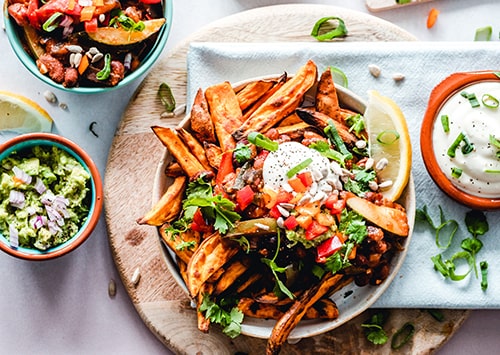
Food has never been so abundant in our Western countries! Supermarket are crumped with thousands of cheap product from all over the world, restaurant and fast-food are at every corner of the street and we can order any meal or groceries at home.
Sadly, this accessibility caused the worldwide obesity rate to break records. We are more likely to die from over-weight related diseases than from undernutrition.
Isn’t our free will to stay fit or not?
Not entirely! The food industry strategy is to offer the cheapest and the most convenient food possible. How is that possible? They select the most efficient food to produce and they add sweeteners, salt and artificial flavors to be sure we will buy more of it.
Doing Zero Waste groceries encourage you to select whole-food that were grown locally. Obviously, it requires a little effort to cook at home to transform these ingredient in exquisite meals. But once you start, it’s a lot of fun and you will rediscover the real taste of the food.
Besides, whole-food also means more veggies, legumes, and seeds. They’re packed with super-nutrients to bring your health to the roof. And your taste buds will discover incredible new flavors and spices!
6. Remove toxins from your body

Every day, our body is bombarded with chemicals.
For instance, we breathe polluted air from the street, we dress with synthetic clothes washed with harmful detergent, we clean our house with powerful sanitizers and we’re probably ingesting plastic from our food staying in contact with the packaging.
Alongside, our medical progress reduces the overall number of cancers, certain types of cancers like thyroid, liver or skin are on the rise, especially for women.
Researchers suspect different carcinogens substances to be responsible.
Have you ever heard the story of Alice who got a benign tumor under her left armpit and who decided to launch her own line of natural deodorant?
That’s the results of decades of blurry information from the cosmetic industry. All these personal care items are packed with a huge inventory of unregulated chemicals.
Shampoo, deodorant, toothpaste, moisturizer, face masks, make-up, perfumes and whatnot.
How is it possible to look and smell good without cosmetics?
Lucky you! There are natural alternatives! It’s even possible to find them without packaging or with degradable packaging.
7. Sustain our Economy
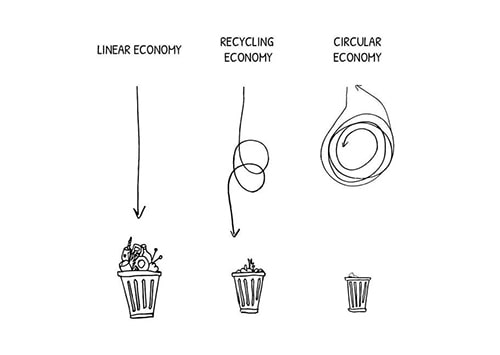
Our entire economy is based on a linear approach.
Industries extract natural resources, they transform them into products, sell them and when we don’t need them anymore, we throw it away. In order to increase sales, companies make products less repairable and they pay engineers to make their lifespan even shorter aka “planned obsolescence”.
As a result, people need to buy more and more products which is fantastic for the economic growth, right?
Except for one thing. We extract more natural resources that Earth can regenerate. So, this ever-growing economic growth will come to an end.
Instead, we can move from a linear production to a circular economy that considers and decreases wasted resources at every stage of the production.
In terms of employment, prolong the life of a product with repurpose infrastructure, repair center, and recycling factories can create up to 30 times more job!
Adopting a Zero Waste is not only about removing visible trash from our lives. It’s also about buying from companies who also believe into circular economy to make their products long-lasting, repairable and produce little waste during the production line.
8. Save money
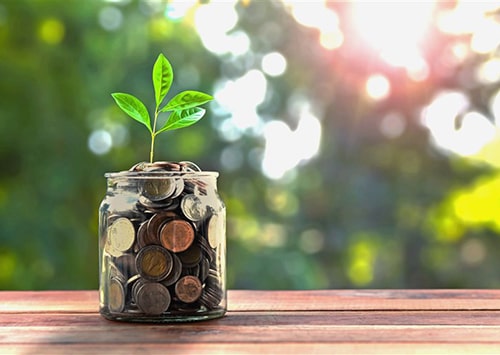
Saving money these days is not an easy task. We must pay the bare necessities like the rent, the bills, insurances and groceries.
But also, as our lives are constantly on the go, we’re often tempted to opt for the quickest, easiest and most accessible items that are usually not made to last long.
Some zero waste bloggers announce that they saved between 15% to 30% during the year they were living more mindfully!
Opting for long-lasting products and reusables is a good start to save money! At a first glance, the price looks higher, but you won’t have to buy a new one before a long time. Did you know that most household products can be made at home? That’s also a bunch of items that you don’t have to buy every month.
Doing groceries in a Zero Waste shops is also a money saver. You don’t pay for the packaging, you can choose the quantity you need and you won’t be tempted by unhealthy snacks.
Moreover, commercials often push us to buy brand new home decoration, new seasonal clothes or the last hi-tech gadgets.
Do you really need them? Buying less will make you appreciate what you already have and you’ll save money for things that really matters.
9. Live Simpler & Happier
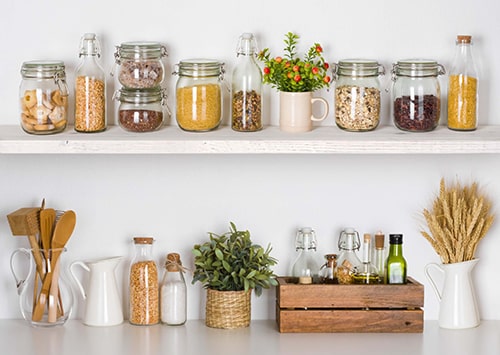
The consumer culture traps us into a feeling of perpetual dissatisfaction.
Commercials will do everything to tell you that what you already have is outdated and they promise you a better life with their new awesome product.
While it’s a great feeling to show your last purchase to friends or colleagues, how long does this joy last ? Usually, only the time before the next mouth-watering commercial.
Does consuming more make us happier?
Reducing waste also means reducing our desire to buy more. This mindset joins the minimalist lifestyle which focuses on “being” instead of “having”.
Surprisingly, living with fewer belongings costs less, requires less time and energy to maintain. It provides opportunities to pursue our truest passions and spend more time with our beloved ones.
Owning less also leads to sharing more. Borrowing from neighbors, bargaining in a second-hand store, or driving a car from car-sharing services.
In the end, these transactions generate genuine social interactions. That’s what defines us as human and it’s the most powerful secret for happiness!
How to start acting?
Wow! That’s a bunch of reasons to start a Zero Waste lifestyle!
What’s the reason that motivated you the most?
If you think about many of them, it’s normal. Our world is a complex system and all these reasons are interconnected!
It’s impossible to solve all the problems at once. That’s why it’s important to stick with one reason that will make you do the first move!
Remember, your individual choices have a huge impact. If we’re enough going in the same direction, we’ll see a change in the world quicker than we think.
Are you feeling ready for the next step? I share with you “How to start a Zero Waste lifestyle”

